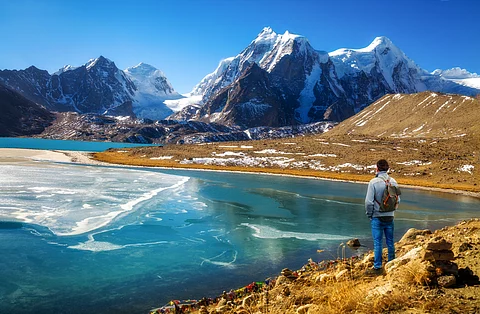
- Destinations
- Experiences
- Stay
- What's new
- Celebrating People
- Responsible Tourism
- CampaignsCampaigns
- SubscribeSubscribe
- Buy Now

Devastating landslides brought on by unrelenting rain pounded North Sikkim (namely Munshithang region along the Lachen-Chungthang route, as well as the Lema on the same road) in April 2025, leaving thousands of tourists stranded. These flooded stretches have also hampered vehicular traffic. In light of these dangerous road conditions, authorities have temporarily halted issuing new travel permits to North Sikkim, and have revoked previously issued permits with immediate effect.
Although Sikkim does not fall under the ILP system for Indian citizens, certain protected zones in the state, particularly in North Sikkim and the Nathu La border area, require special permits issued by local authorities. Following the massive landslides in April 2025, the Sikkim administration suspended the issuance of these permits to avoid further endangering lives, especially with many roads rendered impassable by mudslides and debris.
The situation underlined the broader principle behind travel permits: balancing access with safety, conservation, and cultural sensitivity. Whether in Sikkim or the states covered by the ILP, the authorities prioritise controlled tourism to safeguard both human life and delicate environments.
While reports have surfaced regarding the swift action undertaken by Sikkim's police to help stranded tourists, it remains unclear when Inner Line Permits (ILPs) will return.
An Inner Line Permit (ILP) is an official travel document issued by the Government of India that allows Indian citizens to enter designated protected areas for a limited time. Established under the Bengal Eastern Frontier Regulation Act of 1873 during British rule, the system was designed to regulate commercial and personal travel into certain frontier areas, mainly to protect indigenous communities and their land rights from external influence.
Unlike a visa, which applies to international visitors, the ILP is required even for Indian citizens who are not permanent residents of the areas concerned. Without an ILP, a traveller may find it cumbersome to enter protected regions.
At present, four Indian states enforce the Inner Line Permit system: Arunachal Pradesh, Nagaland, Mizoram, and Manipur. Only certain areas of Sikkim require travel permits at the moment.
These regulations are applicable only to Indian citizens. Foreign nationals are subject to different rules, often involving Protected Area Permits (PAP) or Restricted Area Permits (RAP), depending on the area they intend to visit.
All visitors to Arunachal Pradesh must first get an ILP; permits are normally valid for 15 days, though they may be extended at the discretion of the authorities.
Most districts in Nagaland require an ILP to enter, and as of September 2024, Chümoukedima, Dimapur, and Niuland districts have been added.
Both visitors and employees must have an ILP in Mizoram; these permits are normally valid for a maximum of 15 days, though they may be extended in specific situations.
The most recent addition, Manipur, formally implemented the ILP rule in December 2019 and mandated that all Indian non-residents apply before travelling there.
Protecting the distinctive cultural identities, customary means of subsistence, and delicate ecological systems of the indigenous populations residing in these areas is the main goal of the ILP system. These regions are geopolitically significant since many of them are located near delicate international borders.
In order to avoid demographic imbalances, the ILP system also aids in controlling the influx of foreigners. In addition, states operating under the ILP regime are exempt from some national laws, such as the Citizenship Amendment Act (CAA) of 2019, which does not apply to ILP regions. This demonstrates the degree of protection afforded to the local populace.
Travellers must apply for an ILP either online through the respective state portals or physically at designated government offices. Required documents generally include proof of identity, address verification, passport-size photographs, and details of the travel itinerary. Processing times can vary, although online applications have made the system considerably more efficient in recent years.
It is crucial for travellers to respect the validity period of the ILP. Overstaying without a valid permit can lead to fines, penalties, or even legal action, depending on the state's specific regulations.
(With inputs from various sources.)
